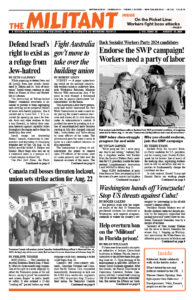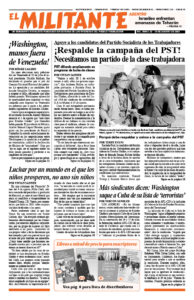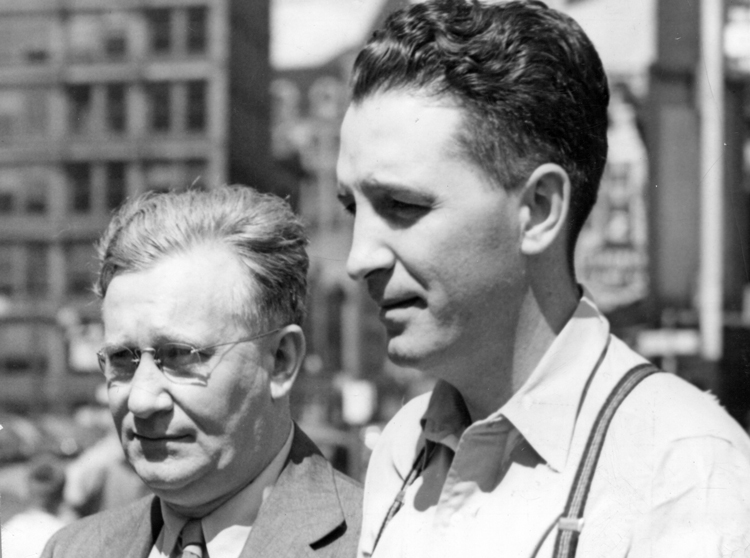With this issue of the Militant, we commemorate the 50th anniversary of the Aug. 21, 1974, death of James P. Cannon, a decadeslong communist leader and one of the founders of the Socialist Workers Party, the party’s first national secretary and the first editor of the Militant.
“It is not far-fetched to record Jim Cannon as the greatest American Leninist of the mid-twentieth century, or even as the best builder of a Bolshevik-type party anywhere in the world after the death of [Bolshevik leader] Leon Trotsky,” Jack Barnes, the current SWP national secretary, wrote in his introduction to the Pathfinder book James P. Cannon As We Knew Him. “Cannon not only did it, but he wrote about what he did so that his experience could be used by others, both in the United States and the rest of the world.”
“Jim’s ability to hold together a cadre where so many others had failed was not only owing to his talent for sizing up a political situation and knowing what to do about it,” wrote Barnes, “but to his appreciation of the human material of the party.”
Cannon was born in Rosedale, Kansas, in 1890 into an Irish working-class family. Won to socialist ideas by his father, he joined the Socialist Party in 1908 and the Industrial Workers of the World in 1911. Inspired by the 1917 Bolshevik Revolution led by V.I. Lenin, Cannon became a founder of the U.S. Communist Party and was elected to its Central Committee in 1920.
After Lenin’s death, and the coming to power of a counterrevolutionary bureaucracy led by Joseph Stalin that overthrew Lenin’s legacy, Cannon was won to the revolutionary perspective put forward by Trotsky. For this, Cannon was expelled from the CP in 1928. He helped found the Communist League of America.
In 1938 Cannon was a founder of the Socialist Workers Party and participated in the founding conference of the Fourth International held in France later that year. He was elected to its executive committee.
As the U.S. government prepared to enter World War II, Cannon was convicted along with 17 other leaders of the SWP and the Minneapolis Teamsters union for opposing the rulers’ imperialist war policy. He served 13 months in Sandstone penitentiary.
Cannon’s testimony during the federal trial can be read in the book Socialism on Trial. The judge asks Cannon about the SWP’s stance on the war. “We do not give any support to any imperialist war,” testified Cannon. “We do not vote for it; we do not vote for any person that promotes it; we do not speak for it; we do not write for it. We are in opposition to it.”
He added, “A declaration for war by the United States government would not change our position.”
Confidence in coming revolution
In 1946 at the close of the war, Cannon presented a resolution, “Theses on the American Revolution,” at the 12th national convention of the SWP. It stated, “The overwhelming preponderance of American imperialism does not exempt it from the decay of world capitalism, but on the contrary acts to involve it ever more deeply, inextricably, and hopelessly. …
“The blind alley in which world capitalism has arrived, and the U.S. with it, excludes a new organic era of capitalist stabilization. The dominant world position of American imperialism now accentuates and aggravates the death agony of capitalism as a whole.”
The SWP was the “sole legitimate heir and continuator of pioneer American communism,” Cannon said. The task of the party is “to remain true to its program and banner; to render it more precise with each new development and apply it correctly in the class struggle; and to expand and grow with the growth of the revolutionary mass movement, always aspiring to lead it to victory in the struggle for political power.”
Until 1953 Cannon was the SWP national secretary, and then national chairman and national chairman emeritus until his death.
He died while 1,250 SWP members and supporters were at the 1974 Socialists Activists and Educational Conference in Oberlin, Ohio. The party organized an Aug. 23 “Political Tribute to Jim Cannon” chaired by Barnes, where over $50,000 was raised to advance the party’s work.
The main speaker was Joseph Hansen, a member of the SWP’s Political Committee. Cannon “was angry at injustice, at exploitation,” he said. “He was angry at poverty, lack of opportunity, oppression, racism and sexism. He seethed over the crimes of capitalism, its wars, its reactionary ideologies. He hated its police, its courts, its prisons, its fascism, its tendency to drop back to barbarism.”
Cannon “burned with fury over Truman dropping the atomic bomb on Hiroshima and Nagasaki and at the chance that the human race might be obliterated in an atomic holocaust,” Hansen said.
Cannon’s “perspective was the long-range one of winning the final battle; that is, the final battle in the struggle to topple capitalism and to replace it with socialism on a world scale.
“In his opinion this was a great perspective, the only one really worth a lifetime of effort,” Hansen said. “He saw it, too, as a realistic perspective, one that would inevitably be realized even if it required the combined efforts of several successive generations of revolutionists.”
Unable to attend the meeting, Farrell Dobbs, Cannon’s successor as SWP national secretary, and his companion, Marvel Scholl, sent a message, saying, “Hail and farewell to Comrade Jim Cannon. When, in 1928, he brought Trotskyism to the United States, it was the beginning of a long uphill fight to continue the building of a genuine revolutionary movement capable of waging an uncompromising fight to bring humankind an enlightened socialist future.”


